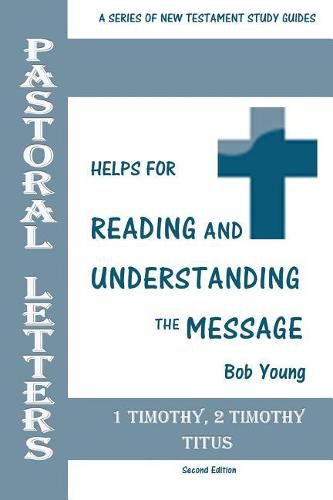Readings Newsletter
Become a Readings Member to make your shopping experience even easier.
Sign in or sign up for free!
You’re not far away from qualifying for FREE standard shipping within Australia
You’ve qualified for FREE standard shipping within Australia
The cart is loading…






Understanding how the Pastoral Letters fit into the chronology of the New Testament is important for determining what was happening in the churches in terms of doctrine and teaching, leadership, and church development. Although the book of 1 Timothy addresses church administrative and organ-izational matters such as worship, leadership, and the function of various groups within the church, the first chapter mentions as primary the need to combat false teaching. Paul mentions the need for healthy church function in 1 Tim. 3:14. Written in a historical context at a time when Paul was anticipating his own death, a clear focus of 2 Timothy is the need for Timothy to endure suffering and hardship as he assumes a greater role in the mission work, but one can also identify several references to false teachers. A part of the work of Titus on Crete was to appoint leaders to help deal with some opponents within the church (Tit. 1:5-9). The admonition to appoint leaders includes the need to correct first some things that were lacking or had been left undone. In addition to these admonitions, one sees in Titus frequent references to false teachers and false teaching. The presence of false teachers demands capable church leaders who can serve effectively. Other topics in the book of Titus include the importance of keeping the believers busy in the work and the need to organize the work and worship of the church so that the false teachers are not given an opening. These brief summaries suggest that a common purpose of the Pastoral Letters is to address the presence of false teachers in the church. This purpose is seen in the contents of the teaching, the organizational instructions, and the desire to give both Timothy and Titus authority. Very early in church history, some in the churches desired to deviate from the form of the apostolic teaching known as the kerygma. The false teaching described in the Pastoral Letters appears to have elements of Roman philosophy, Judaism, and perhaps some early Gnosticism. All three of the Pastoral Letters have a strong emphasis on sound words, sound teaching, doctrine, and godliness.
$9.00 standard shipping within Australia
FREE standard shipping within Australia for orders over $100.00
Express & International shipping calculated at checkout
Understanding how the Pastoral Letters fit into the chronology of the New Testament is important for determining what was happening in the churches in terms of doctrine and teaching, leadership, and church development. Although the book of 1 Timothy addresses church administrative and organ-izational matters such as worship, leadership, and the function of various groups within the church, the first chapter mentions as primary the need to combat false teaching. Paul mentions the need for healthy church function in 1 Tim. 3:14. Written in a historical context at a time when Paul was anticipating his own death, a clear focus of 2 Timothy is the need for Timothy to endure suffering and hardship as he assumes a greater role in the mission work, but one can also identify several references to false teachers. A part of the work of Titus on Crete was to appoint leaders to help deal with some opponents within the church (Tit. 1:5-9). The admonition to appoint leaders includes the need to correct first some things that were lacking or had been left undone. In addition to these admonitions, one sees in Titus frequent references to false teachers and false teaching. The presence of false teachers demands capable church leaders who can serve effectively. Other topics in the book of Titus include the importance of keeping the believers busy in the work and the need to organize the work and worship of the church so that the false teachers are not given an opening. These brief summaries suggest that a common purpose of the Pastoral Letters is to address the presence of false teachers in the church. This purpose is seen in the contents of the teaching, the organizational instructions, and the desire to give both Timothy and Titus authority. Very early in church history, some in the churches desired to deviate from the form of the apostolic teaching known as the kerygma. The false teaching described in the Pastoral Letters appears to have elements of Roman philosophy, Judaism, and perhaps some early Gnosticism. All three of the Pastoral Letters have a strong emphasis on sound words, sound teaching, doctrine, and godliness.